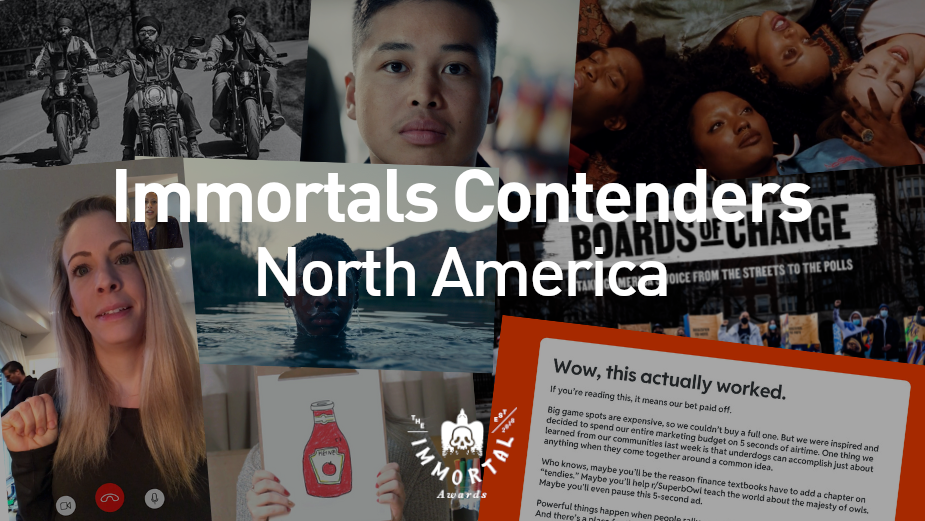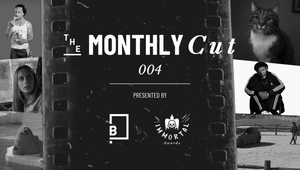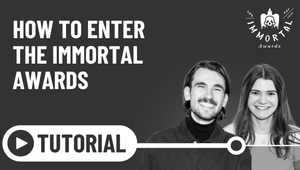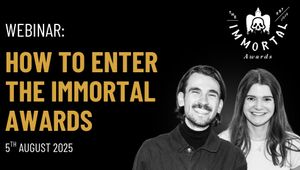
8 North American Contenders for The Immortal Awards 2021

319 projects were entered from North America into The Immortal Awards. Only eight have made it through to this week's final, global round of judging. Much of the successful work was very much rooted in culture and spoke to the times that North America and much of the world is facing right now, with five of the eight focusing on issues around diversity and race.
As we gear up to find out Immortal and Commendation winners for 2021, LBB's Americas editor has caught up with the creators of the eight North American Finalists.
Beats by Dre - You Love Me
“Honestly, it's so raw and full of emotion. You can’t separate the memory from the moment. The world was grappling with the murder of George Floyd as it was grappling with the fear of life in a pandemic. People were literally dying all around us that summer - by violence and illness. Melina [Matsoukas, director] wanted to create something that didn’t reflect the horror of the moment but the hope for the future. Not in a way that erased the present but which acknowledged it. Acknowledged the pain, the hatred, the real issues that people were pledging to eradicate but not doing anything about. When she came up with this concept, it’s like we all held hands to will it into life - from Melina creating something totally different than the brief because she wanted to normalise Black joy not violence, to bringing on her creative partners Lena [Waithe] and Solange [Knowles] to write and score it, to Steve Stoute and his agency Translation committing themselves to bringing this message to life at all costs, and Beats as the client not just believing in this message but making sure it was amplified everywhere. Everyone had a part and was critical to the process. It wouldn’t have been heard without everyone coming together. It took bravery and resilience on everyone’s part.
“Including everyone on set. Set was brutal - everyone was there in masks in the heat with water stations far away due to Covid restrictions. An officer assigned for our permit arrived with a ‘Blue Lives Matter’ mask as we were filming the great Janaya Future Kahn. While it was a gut punch to everyone there, it was a visual reminder why we needed to persevere and make sure this message was captured. Malik Sayeed, the incredible DP, had to change how he shot scenes to make sure people were filmed from a distance to keep everyone safe. It felt like life or death on this set. The risk of Covid yes, but even more so making sure the message was not compromised and was delivered safely to the world. Everyone knew they were needed to make sure this was heard. I will never not think about making this project without feeling raw, emotional, and grateful for the bravery of everyone involved.
“In advertising we see a lot of people hopping on a bandwagon to try to deliver a message they show no history of supporting as a brand or really no right to say. Spots that want to be powerful but in their sameness they become a blur and unheard. Or we call bullshit on as an audience because it feels exploitative. This spot said something out loud that people normally whisper. You love my culture, but do you love me? Because it could. It was an idea created by a Black woman, written by a Black woman, scored by a Black woman, DP’d by a Black man, supported and nurtured by an agency founded by a Black man and helmed by Black creatives, for a brand founded by a Black man with Black creative leadership, by a production company that was co-founded by a Black man. Of course people of every colour contributed, but I believe this piece resonated because in its DNA it came from a place of personal truth at every touchpoint and it was a message that was delivered loudly, without apology. It’s honest, confrontational, probing, self-aware, emotional, raw - all of these things, and the experience changes depending on the colour of your skin - if you are the asker or the receiver of the question. But either way, it makes you feel and it makes you think, and I hope that it resonated because it mattered.” Ali Brown, president, PRETTYBIRD
“I remember watching the piece before we started grading and being awe-struck by the copy; it was so honest, raw, and real. Everyone in the bay was on the same page: The copy and these beautiful images had to focus. It wasn't about the filmmakers, and it wasn't about imposing some kind of ‘look’. From my standpoint, it was about keeping the imagery authentic and supplementing the message, never dominating it. The actual grade was a very effective collaboration because everyone involved had the exact same idea about how the finished spot should feel.” Sean Coleman, colourist, Company 3
Blacktag - Black Art is Black Money
No entrant commentary was obtained for this remarkable piece of filmmaking but it was a crowd favourite that subtly glided through both the US and North American round of judging with next to no resistance. Directed by Akin Adebowale and Ousman Sahko Sow, the founders of Blacktag, an online community of Black creators, and entered by Company 3 (who did the grade), the film serves as a mission statement for the business. It opens with a clip of Little Richard as a presenter at the Grammys in 1988 who, despite his influence on rock and roll, had never even been nominated for a Grammy. It also stars six Black creatives sitting around a book called ‘White Book of Atrocities’, which serves just as a prop but is filled with examples of cultural appropriation and discussion on the influences of Black culture on everyday trends. Its message is similar to Beats by Dre ‘You Love Me’ but the execution of each is wildly different. “One of the standout pieces for me was the film Blacktag,” said juror and founder of Zulu Alpha Kilo Zak Mroeuh. “Content pieces don’t always resonate well in an advertising jury room filled with people with short attention spans, but this film kept every judge glued to their Zoom screen.”
Canadian Women's Foundation - Signal for Help
“Initially, there was a small team behind this project. We worked closely and iteratively with our clients, The Canadian Women's Foundation, so that we could move at pace and with precision. After we landed on the idea, it became a truly collaborative process with the aim of getting as much scale and awareness as possible.
“The idea was born out of a real need to help those suffering from domestic violence during lockdown, by creating something that could be easily and discreetly communicated over video calls. Since then, it has become something much bigger because it's a non-verbal way to ask for help that breaks through language barriers. Behind all the awareness there are now high-profile cases of the signal being used to positive effect, most recently by the abducted minor in Kentucky, who was rescued when a driver passing by recognised the Signal For Help. I think it's an idea that really demonstrates how creativity can be used for good.” Graham Lang, chief creative officer, Juniper Park\TBWA
City of Chicago - Boards of Change
“I remember every minute of it. From the second the idea was born to the moment I turned on the news and saw people scanning the booths.
“I particularly remember talking to our clients, the great reception the work received and our mutual understanding that we had the opportunity to help bring about change, one vote at a time. I remember our amazing team scrambling to get out there, talking to store owners and artists, collecting every possible board before it was thrown out. I remember reviewing design after design… after design. Long nights and early mornings. Working, discussing, reworking. Pushing every aspect of the execution to make sure this was going to have the impact our city and our people needed.
“I remember how all the artists behind the boards got excited to see how their piece was getting a second life and becoming even more powerful. How, from one day to another, their artwork turned into an enabler of change. I remember that email from The George Floyd Memorial Foundation, expressing how much they appreciated the initiative. And I’ll never forget the feeling that while the world was talking about what to do, we were already taking action through the power of creativity.
“Last year changed us all. We became more aware of what’s happening, the injustices, how history keeps repeating itself. We all saw how the world collapsed yet again and realised that enough is enough. ‘Boards of Change’ was the right message at the right time. It helped turn a dark moment into a beacon of hope, into tangible action for a brighter future. One where history will one day stop repeating itself. And I think that’s what the judges felt as well.” Andrés Ordóñez, chief creative officer, FCB Chicago
Heinz - Draw Ketchup
“It started with the simple insight that when people think ketchup, they think Heinz. It’s one of those brands that’s synonymous with the category. As we looked for an engaging way to bring that insight to life, we loved the idea of asking anonymous participants to draw ketchup. There was something fun about taking everyone back to grade school with a good old-fashioned drawing assignment. Working with non-actor participants from all over the world led to a lot of spontaneous, unscripted moments that made for a fun shoot and dynamic spot.
“It’s an easy campaign to connect with, because the heart of the idea is a subconscious brand association that the general public has with Heinz. It’s a simple premise that naturally lends itself to interesting executions. The spot tells the story of our social experiment, and from that experiment we got hand-drawn illustrations to use as an OOH campaign, with hand-drawn labels to put on actual bottles of Heinz in-store. So we ended up with a multinational, far-reaching campaign that was held together by this very simple sentiment: Heinz is ketchup.” Mike Dubrick, ECD and managing partner, Rethink
Mastercard - True Name
“The most vivid and powerful memories I have of working on this project are the stories I heard from trans and nonbinary people. The amount of courage it takes for a person to live their truth in the face of misunderstanding, marginalisation and hate cannot be underestimated. These are people who, in some cases, were rejected by their families; some moved across countries or across the world; and still others faced multiple daunting, physically demanding surgeries. And they did this (and do this) because there is a truth inside them which needs to be lived. The strength of conviction and character that this takes is incredible. And it’s something I will never forget.
“I would hope [this campaign resonated] because this is an idea that helps people in a very real way. And because the client had to take a leap -not of faith, but of conviction. By putting this out there in the world as a challenge to the industry, they were able to get multiple banks and markets to follow suit. Even their competitors. This is the sort of leadership and moral purpose that we all hope for from companies. And I hope the jury sees it as very much worth celebrating.” Pierre Lipton, EVP global executive creative director, McCann New York
Pfaff Harley-Davidson - Tough Turban
“One memory that sticks out was the very first time we saw an early prototype tried on by a member of a Sikh Motorcycle Club. It was a powerful feeling to see something that had existed only in a deck and as computer render come to life before our eyes. It’s great that diversity and inclusion are talked about more and more in brand communications. But we felt like this was a step beyond by actually innovating and developing a product for a diverse community. It’s proof that when you hire creatives from diverse backgrounds, you can tap into cultural insights that might have otherwise been missed.” Vic Bath and Dan Cummings, creative directors, Zulu Alpha Kilo
Reddit - Superb Owl
“I remember the Wall Street Bets moment and it becoming a HUGE story, really really fast.
“It felt like all eyes were on Reddit. Everyone from financial people, to famous people, to everyday people. Even my 70-year-old mum called to ask me about what was happening with Reddit. The story was so big that people started writing the narrative for Reddit.
“We had to decide how to react.
“The safe thing was… to do nothing. But we believed in our Reddit community.
“And, as marketers and messengers for the Reddit brand, it was our responsibility to meet the moment. Our confidence in what Reddit stands for - bringing community and belonging to everyone in the world - inspired us to act (and also gave us the permission to do something ballsy like this!).
“We discussed so many options. Fun guerilla responses, digital takeovers in the New York Times and the Wall Street Journal highlighting the power of our community. But nothing felt big enough (or Reddit enough) to match the moment. That’s when the Super Bowl became the topic of conversation.
“The problem was we were seven days away from the game. Nobody should have been stupid enough to try to do what we did. With no production budget, no time, no media, and no idea we were underdogs in our own right. For this to work we had to create a groundbreaking piece of creative, with a unique media execution in under a week.
“We made a Super Bowl experience playing by our own rules - pitting a long copy jpeg against big budget ads. And doing this in five seconds? When we pushed CBS for a five-second spot they said… WHY? Then we knew we were onto something awesome.
“[I think it resonated] because it goes against everything we’ve learned as marketers.
“60 seconds? No, we did five.
“Short copy? No, we had 11 sentences.
“Pitch ahead of time? No, we let the moment speak for itself.
“Celebrities? No, we just used a .jpg.
“National buy? No, we bought strategic markets.
“We blew up an old media system using 1/10 of the budget and delivering 6.5B impressions.
“We remained true to our brilliantly absurd Reddit brand and to our anti-bullshit users.
“And because it was fucking fun.” Ellie Bamford, SVP, global head of media & connections at R/GA
Thanks to our wonderful Immortal Awards partners















